Syndicate Bio signs drug research MoU with Nigerian Institute of Medical Research
Syndicate Bio has partnered with the Nigerian Institute of Medical Research to conduct drug discovery research on infectious and non-infectious diseases.

Abasi Ene-Obong’s new genomics startup, Syndicate Bio has signed a Memorandum of Understanding (MoU) with the Nigerian Institute of Medical Research (NIMR) to conduct drug discovery research on infectious and non-infectious diseases in Nigeria.
“After several months operating in stealth mode, today marks a pivotal moment for Syndicate Bio. Our signed MoU with the Nigerian Institute of Medical Research enables us to shift from stealth to actionable impact, empowering inclusive advancements in African genomics,” Ene-Obong, co-founder and CEO of Syndicate Bio said in a statement seen by Bendada.com.
The former co-founder and CEO of the now defunct genomics startup, 54gene, and his new co-founders—Jumi Popoola and Estelle Dogbo—launched Syndicate Bio in September to drive genomics and precision medicine initiatives across the world’s most diverse regions, starting from Africa.
At the launch last month, Ene-Obong said “[Syndicate Bio will] use large-scale partnerships with governments, pharma companies, academia, and other stakeholders to drive local precision medicine impact while creating powerful datasets that can be used for drug discovery and development.”
This is the genomics startup's first disclosed partnership. “The NIMR’s partnership with the newly launched Syndicate Bio is a testament to what can be achieved when public research institutions and private innovation collaborate,” says Babatunde Lawal Salako, Director General and CEO of the Nigerian Institute of Medical Research.
He added that “NIMR hopes to bring its rich, robust experience in genomics and infrastructure to bear on the successful implementation of this much-needed collaborative effort. Together, we will harness the genetic diversity prevalent in Nigeria, and translate them into pioneering healthcare solutions tailored for both the local populace and the global community.”
As part of this partnership, the duo will establish a training program for young scientists in Nigeria, aimed at providing theoretical and practical knowledge of molecular biology, genetics and genomic techniques, thereby equipping them to drive Africa’s scientific narrative, according to Ene-Obong.
“Our strategic alliance with NIMR not only sets a new bar for public-private collaboration in drug discovery, it also serves as an urgent summons to invest in Nigeria’s next generation of scientists,” he added.
Additionally, NIMR will provide ethical oversight through its internal ethics body and the National Health Research Ethics Committee in managing the data and samples generated by the research projects.
“Together, we will harness the genetic diversity prevalent in Nigeria, and translate them into pioneering healthcare solutions tailored for both the local populace and the global community,” Salako said.






